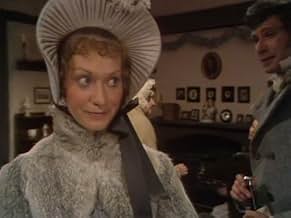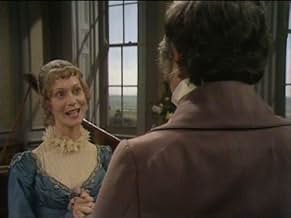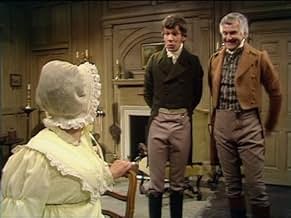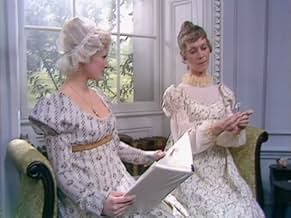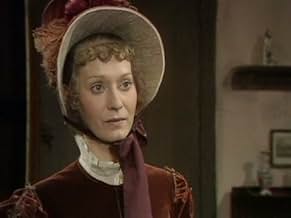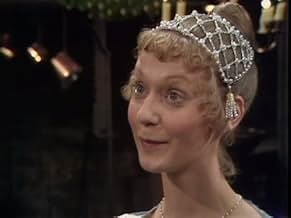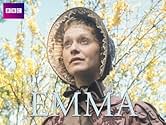अपनी भाषा में प्लॉट जोड़ेंWhile matchmaking for friends and neighbours, a young 19th Century Englishwoman nearly misses her own chance at love.While matchmaking for friends and neighbours, a young 19th Century Englishwoman nearly misses her own chance at love.While matchmaking for friends and neighbours, a young 19th Century Englishwoman nearly misses her own chance at love.
एपिसोड ब्राउज़ करें
फ़ीचर्ड समीक्षाएं
This old BBC serial from the 70s is a slow ramble through one of Jane Austen's great novels. Like all slow rambles there are lots of incidental delights on the way. Time is given for the development of character and the unravelling of the plot. The later film with Gwyneth Paltrow is faster but shallower. This is plainly filmed and there is none of the gorgeous lighting effects that decorate the Paltrow film. Some of it is shot outdoors, notably the Box Hill scene, but it is mainly unfussy interiors.
Doran Godwin's performance as Emma is fine. She brings out the contradictions and weaknesses in her character as well as her many strengths. Jane Austen wanted a heroine that no one would like but herself, then proceeded to create a fully rounded character who is very likeable. The length of the mini-series enables there to be many scenes between Emma and Harriet and Emma and Mr Knightly that illustrate all their characters well. Debbie Bowen and John Carson give excellent support.The rest of the cast of British actors are good. Constance Chapman as Miss Bates is touching and Fiona Walker rips into the part of Mrs Elton with great relish. Donald Eccles is perfectly tiring as Mr Woodhouse.
There seem to be two ways to film Jane Austen. The slower but more complete version like this film and 'Sense and Sensibility' (1971) or the modern upbeat shorter film like 'Emma' (1996) or 'Mansfield Park' (1999). Perhaps only the BBC's 1995 mini series of 'Pride and Prejudice' created the perfect fusion.
This 'Emma' is well worth seeing. If you adjust yourself to the gentle pace there is plenty to enjoy
Doran Godwin's performance as Emma is fine. She brings out the contradictions and weaknesses in her character as well as her many strengths. Jane Austen wanted a heroine that no one would like but herself, then proceeded to create a fully rounded character who is very likeable. The length of the mini-series enables there to be many scenes between Emma and Harriet and Emma and Mr Knightly that illustrate all their characters well. Debbie Bowen and John Carson give excellent support.The rest of the cast of British actors are good. Constance Chapman as Miss Bates is touching and Fiona Walker rips into the part of Mrs Elton with great relish. Donald Eccles is perfectly tiring as Mr Woodhouse.
There seem to be two ways to film Jane Austen. The slower but more complete version like this film and 'Sense and Sensibility' (1971) or the modern upbeat shorter film like 'Emma' (1996) or 'Mansfield Park' (1999). Perhaps only the BBC's 1995 mini series of 'Pride and Prejudice' created the perfect fusion.
This 'Emma' is well worth seeing. If you adjust yourself to the gentle pace there is plenty to enjoy
I haven't seen Kate Beckinsale's version in a while, but I do have fond memories of that and shall re-visit it soon. I did enjoy the Gwyneth Paltrow film though that's probably the least effective adaptation-wise, and while the 2009 series with Romola Garai had one or two scenes that didn't work I loved that one too. But I consider this Emma the best version. I too would've liked a few more outdoor scenes to have more of a glimpse of the outside world, and Debbie Bowen does play Harriet a little too broadly. However, it looks beautiful, the interiors more than made up for the lack of outdoor scenes and the scenery and costumes are likewise sumptuous with the photography not too stiff. The writing is thoughtful and witty, and the story is leisurely and gently told in a deliberate way and in spirit and in most details it is true to Jane Austen. Doran Godwin may be too old for the titular character, but what mattered more to me was how she interpreted the role, and I think she did a very good job with Austen's most multifaceted character. John Carson is the same as Knightley, but still turns in a likable performance. Mr Woodhouse is very funny and splendidly played by Donald Eccles(though I personally think Michael Gambon in the 2009 series was a tad more dimensional), while Ania Marsan, Robert East and Constance Chapman give the best Jane Fairfax, Frank Churchill and Miss Bates I've seen, great performances and their characters are very well developed. Overall, wonderful. 9/10 Bethany Cox
I have rated this quite highly on two counts - one, the casting (largely forgotten names litter the cast including Doran Godwin as Emma, John Carson as Mr Knightley, Debbie Bowen as Harriet, Constance Chapman as Miss Bates, and Timothy Peters as Mr Elton) and two, an absorbing adaptation even if done in obviously studio (and rather cheap) sets.
Running at four hours plus, this version does more justice to the book than more cursory and recent attempts have been able to. Although both Emma and Knightley come across as a little older than they should be (21 and 39 I believe in the book), their growing understanding is believable, and you do find yourself hoping for that elusive happy ending.
What does mark it down is the annoying tune! Quick bit of trivia: Blackadder fans should note that Robert East, Prince Harry in the first series, is here as Frank Churchill.
Running at four hours plus, this version does more justice to the book than more cursory and recent attempts have been able to. Although both Emma and Knightley come across as a little older than they should be (21 and 39 I believe in the book), their growing understanding is believable, and you do find yourself hoping for that elusive happy ending.
What does mark it down is the annoying tune! Quick bit of trivia: Blackadder fans should note that Robert East, Prince Harry in the first series, is here as Frank Churchill.
I have seen each of the three main video versions of Emma (this 1972 BBC version, the Kate Beckinsale version, and the Paltrow version) several times (as well as having read the book) and I love each of them. It is so rare to get gentle, subtle, nuanced psychological drama, that I find I turn to Emma again and again. I think which one you enjoy most on a particular afternoon or evening will depend on your mood. The Paltrow version is lightest and funniest, entertainment to cheer you up; the Beckinsale version engages you as a serious drama of a beautiful young woman, is the most realistic, it is what you want if you want to feel transported back to the time the story happened. This 1972 version's strength is that it presents the psychological complexity of the characters with more fidelity and completeness to the portrayals in the novel. Due to the early 1970s production values, this version appears a bit stagy, and that can be off-putting if you've never seen that kind of TV before (I am a little over 50, so I remember seeing these kinds of productions when they originally aired, which may make it easier for me to get past the artificiality). One problematic element for me is that the actress who plays Emma is about 6 years too old, and she is not as attractive as Beckinsale or Paltrow, and these factors were a problem for me on my first viewing of this version. However, on second and subsequent viewings this was not so much of an issue, and I was able to appreciate her very nuanced portrayal of Emma's feelings and reactions and the process of learning more about human nature, and about the limitations of her own ability to imagine what the hidden feelings are of other people. Also, it took a second and third viewing to realize that the character of Emma's father, as presented here, is a comic character, because here, in a novel which is so much about weddings, he always finds weddings a distressing and melancholy business. His toast to the engaged couples in the very last scene (a toast not in the book) is a humorous reversal of the praise and delight for matrimony we expect. Another element that comes out in this version is the similarity between Emma's father, an invalid who always wants his daughter Emma by his side and who opposes the idea of her marrying, and Frank Churchill's step-mother, Mrs. Churchill, who is also an invalid who always wants her stepson Frank by her side and opposes the idea of his marrying. It always used to bother me that invalid Mrs. Churchill, who is so important to the story, never makes an appearance in the story, until I realized that, in effect, she had: she is the female version of Emma's father, and everything you want to know about her, you may find in him. The negative attitude of the characters towards her is likely the same negative attitude they would have towards him, if he lived far away and all they knew about him was that he used his claims of illness to keep his daughter close. The very last scene of this version also develops a similarity in the personalities of Emma and Frank that is missing from the other versions and that is necessary, I think, to understand just how psychologically complex Austen's novel really is.
A very refreshing thing about all versions of Emma is that every character is genuinely good-hearted and wants good for the other characters, but their own quirks, self-centeredness, and inability to understand other people means they cause pain to each other despite their good intentions. The only exception to this is Elton, who justly feels that Emma misled him about her affections in her attempt to unite him to Harriet, and in unjust retaliation he snubs Harriet on one occasion. The characters' ability to find happiness depends not on whether they defeat some unrealistic 'bad guy,' but on their ability to learn more about the true understanding of what others feel, and what they feel themselves. That's what the art of story-making should focus on, in whatever form (book, movie, TV, or stage) the story is told.
A very refreshing thing about all versions of Emma is that every character is genuinely good-hearted and wants good for the other characters, but their own quirks, self-centeredness, and inability to understand other people means they cause pain to each other despite their good intentions. The only exception to this is Elton, who justly feels that Emma misled him about her affections in her attempt to unite him to Harriet, and in unjust retaliation he snubs Harriet on one occasion. The characters' ability to find happiness depends not on whether they defeat some unrealistic 'bad guy,' but on their ability to learn more about the true understanding of what others feel, and what they feel themselves. That's what the art of story-making should focus on, in whatever form (book, movie, TV, or stage) the story is told.
10pabzum
I have just finished watching this adaptation of Emma for the first time and I feel I must openly declare here that it seems to me quite shameful that the Paltrow and the Beckinsale versions should be more often remembered. How that is to be explained I am at a loss to tell. It is true that John Carson may not look to be the epitome of Knightleyness, but he does a most excellent job of acting like Mr Knightley, and that is what one should care about, I say. Indeed, I was gratified by the sheer intelligence and sensitivity of all the actors in it, the director, the screenwriter and even the dress-maker or whatever she is called. The clothes and dresses may not all have been true to the times but most certainly they were thoughtfully true to the characters.
Also, wonder of wonders, there is no musical soundtrack to pester one's feelings telling them what to feel at every turn. What that does is it helps to make dialogues sound truthful, natural and issuing from people who are thoroughly engaged both as actors and characters in listening to each other.
Another thing that has contributed to place this in my estimation as the best extant adaptation of Emma is that there is no symbolic meddling with the story (excepting perhaps on the last tableau). One thing I love in Jane Austen which is of course not what there is to be loved in other authors is that nothing she writes has any symbols: every little thing is whatever it is, no less, no more. And I unconditionally praise the director John Glenister, the screenwriter Denis Constanduros and the producer Martin Lisemore for having seen that simple fact about Jane Austen and for having brought the book to life so clearly and so lovingly.
So three cheers for them, and five to Doran Godwin.
Also, wonder of wonders, there is no musical soundtrack to pester one's feelings telling them what to feel at every turn. What that does is it helps to make dialogues sound truthful, natural and issuing from people who are thoroughly engaged both as actors and characters in listening to each other.
Another thing that has contributed to place this in my estimation as the best extant adaptation of Emma is that there is no symbolic meddling with the story (excepting perhaps on the last tableau). One thing I love in Jane Austen which is of course not what there is to be loved in other authors is that nothing she writes has any symbols: every little thing is whatever it is, no less, no more. And I unconditionally praise the director John Glenister, the screenwriter Denis Constanduros and the producer Martin Lisemore for having seen that simple fact about Jane Austen and for having brought the book to life so clearly and so lovingly.
So three cheers for them, and five to Doran Godwin.
क्या आपको पता है
- ट्रिवियाThe actors playing husband and wife John and Isabella Knightley(Yves Tighe and Belinda Tighe)are brother and sister in real life.
- गूफ़The characters are seen playing cards with a modern deck of cards that show both the suit symbol (hearts, clubs, spades, clubs) and a number on each corner. During the time period the movie was set in, playing cards did not show the number of the card in the corners.
- कनेक्शनFeatured in Funny Women: Mollie Sugden (1999)
- साउंडट्रैकThe Twenty-ninth of May
Traditional
From John Playford's 'The English Dancing Master', First Edition (1651)
[theme]
टॉप पसंद
रेटिंग देने के लिए साइन-इन करें और वैयक्तिकृत सुझावों के लिए वॉचलिस्ट करें
- How many seasons does Emma have?Alexa द्वारा संचालित
विवरण
- रिलीज़ की तारीख़
- कंट्री ऑफ़ ओरिजिन
- भाषा
- इस रूप में भी जाना जाता है
- Эмма
- फ़िल्माने की जगहें
- Uppark House, South Harting, West Sussex, इंग्लैंड, यूनाइटेड किंगडम(Exteriors of Hartfield, Emma's home)
- उत्पादन कंपनी
- IMDbPro पर और कंपनी क्रेडिट देखें
इस पेज में योगदान दें
किसी बदलाव का सुझाव दें या अनुपलब्ध कॉन्टेंट जोड़ें


